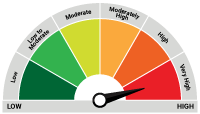Investing for the Highest Returns? 5 Factors to Consider
Posted On Tuesday, Sep 20, 2016
These days, there is no shortage of investment options. We are all eager to earn the highest possible returns on our investments, but a barrage of options can lead to a serious case of 'paralysis by analysis'. Life would be so much easier if someone could just break it all down for you! Let's try to do just that. Broadly speaking, when considering your expectations for investment returns, below are the five key factors that will determine a general rate of return you can expect on your investments:
1) Your investment objective
2) Your age and financial responsibilities
3) Your liquidity (Availability of funds)
4) Your risk-bearing capacity
5) Your investment timeline
First, you should have a clear objective before investing your money. The objective could be for the ultimate goal of a property purchase, children's education and marriage, retirement planning and so on. It could also be a near-term objective of saving for a foreign trip, or buying a bike. Once you have an idea of that objective, then some of the other factors will fall into place in guiding your investment decisions.
Second, your age and financial responsibility play a vital role in any investment decisions. By and large, investment at a young age is beneficial to your long-term financial health as youngsters usually have fewer financial responsibilities like spouses or children or retired parents under their care. Furthermore, it's never a bad idea to start building your financial knowledge earlier on in life, but it's no sin if you didn't - even if you are further along in life, organizing your financial future can still pay off handsomely over the years to come.
Third, your availability of funds is an important consideration. If you have debts to pay off (e.g. a car or home loan), you may find yourself with a hampered tendency to make regular investments. There's no problem at all with that; you don't want to find yourself in the position of having a debt payment you can't meet because you put money in the stock market hoping for a quick gain but the market dropped. When making investments, you need to determine how soon you will need the money, and if you have available cash lying idle, it pays to think about how best to deploy that.
With that in mind, one of the most critical factors next affecting investment decisions is your risk-taking ability. An individual's risk-bearing capacity should be higher at a younger age - younger investors can take advantage of the power of compounding over the long-term and can withstand the swings of the market due to recessions or global crises. However, even at a younger age, if you determine that you'll have need for your funds very soon, it's generally not advisable to put money in the stock market. So the old investment advice of 'higher risk, higher return' is something that all investors should heed before they invest - in your younger years, you can accept more volatility by way of the stock market with the prospect of higher long-term rewards.
All of this flows into the final point, namely that the timeline of your investment is the fifth important factor in determining your investment return goals. If you think you will need funds very soon, it's extremely risky to put those funds in the stock market, as markets can swing heavily in either direction on virtually any news, whether or not it is relevant to the stocks in which you're invested. Now in India, fixed deposits, gold and real estate are generally the most preferred investment options. However, if your timeline is such that you can think 3+ years ahead (ideally 5 or more), equity investments have the potential to generate very good returns. Unfortunately, it seems that Indian investors could be better informed about the investment opportunities in the stock market.
What is the stock market?
According to Investopedia, the stock market is the market in which shares of publicly held companies are issued and traded either through exchanges or through over-the-counter markets. In simple words, it is a place where one can buy and sell shares.
What are mutual funds?
According to Investopedia, a mutual fund is an investment vehicle made up of a pool of funds collected from many investors for investing in securities such as stocks, bonds, money market instruments and similar assets.
So why choose a mutual fund rather than individual stocks? Investment in mutual funds curtails risk for several reasons:
• You get a professional team of fund managers
• You have different products for all types of investors – risk avoiders and risk takers
• Mutual Funds are regulated by SEBI
• Transparent and tax-saving schemes
When you invest in a mutual fund, a team of qualified fund managers invests your savings in various investment options, like equity, debt, or a gold fund, with the objective to earn higher profit while keeping the risk of losing capital in check. Risk is an integral consideration for any investment, and unless you plan on spending full time for analyzing your investment risk, it makes sense to solicit outside help.
What are equity and debt mutual funds, what is the difference between the two?
In short, an equity fund is a mutual fund that invests principally in stocks. A debt fund invests in short-term or long-term bonds, securitized products and money market instruments.
| Equity Vs. Debt Fund | ||
| Factor | Equity Fund | Debt Fund |
| Capital/Principal | Can go down | Limited downside |
| Returns on investment | No limit on upside/downside | Limited upside/downside |
| Volatility | Higher | Limited |
| Example | Quantum Long Term Equity Fund | Quantum Dynamic Bond Fund |
In simple words, equity means shares and debt means loans. The governments and many private companies need huge amounts of cash to run. If they do not have cash available, then the governments and companies raise the needed money by issuing bonds to investors. Debt mutual funds are one such group of investors. The bonds they buy will consist of a principal amount, which is the initial investment (i.e. the loan) and is paid off at maturity, and periodic interest payments that are based on how risky investors think the borrower is (the interest rate is also referred to as the yield of the bond, with some caveats that we won't dive into here). Bonds issued by the government are the most secure as they are backed by the government, but bonds issued by companies are also worth investment consideration as long as the underlying risk is properly assessed. Returns from debt mutual funds are influenced by many factors like interest rates, currency fluctuations, inflation rates, the current account deficit of the government and credit risk. Since debt as a whole is more risky than merely leaving cash idle, debt investments tend to generate higher returns over time than cash, just not as high as in equity. That said, debt funds come with more risk than just leaving the cash idle, as the borrower can default, or worries about global interest rates can make investors sell that debt, causing the price to drop in the short term. With all that to think about, it often makes sense to let a professional team analyze that for you.
In the case of equity, a stock price has many drivers like the performance of the company, the industry, the economic and political circumstances of the country in which the company operates and so on. Over longer time periods, the performance of the company and its stock should track each other rather closely. In the interim, though, are great opportunities: for instance, frequently an overall sector is not in good shape but one of the companies in that sector has prospects to do relatively well in the future, suggesting that the stock price of that company may have upside (your typical "baby thrown out with the bathwater" scenario). However, this can be risky as misreading just one or two critical indicators can be the difference between the stock's success or disaster. Stock selection is a major task, which is why professional guidance is useful in curtailing the underlying risks.
Every investor should select the investment avenue that best suits his/her financial needs. Both equity and debt funds have an objective of creating profitable investment, though debt funds are far more focused on providing a return over and above the initial capital investment by way of interest. As laid out above, consider all five factors before making your investment decision - perhaps your most sensible option is just leaving it in cash, should you have short-term funding needs.
What should an investor do?
Today, India is one of the fastest growing economies in the world. It grew at 7.9% in the March quarter and recorded a five-year high growth rate of 7.6% for the 2015-16 fiscal year on robust manufacturing growth*. Inflation and interest rates are under check and likely to remain in the RBI's comfort zone. Recently departed RBI governor Dr Raghuram Rajan and his successor Urjit Patel are on the same page on inflation, so rest assured, inflation targeting will likely remain RBI's core task.
India's growth story is compelling, and investors should invest in suitable financial products to gain from that story. In particular, the lack of equities in the average Indian's asset allocation has caused many people to miss out on opportunities over the last several years as markets have risen. While there have been ups and downs over that span, the overall long-term result has been quite favorable just in the past fifteen years. This reinforces the notion that patience is required for successful long-term investment. No doubt it is a difficult task, but a careful selection of financial products has the potential to generate better returns in the long term than just sticking with more traditional options that have dominated Indian investors' portfolios in the past.
Stay invested!
Product Labeling
| Name of the Scheme & Primary Benchmark | This product is suitable for investors who are seeking* | Risk-o-meter of Scheme |
| Quantum Long Term Equity Value Fund An Open Ended Equity Scheme following a Value Investment Strategy | • Long term capital appreciation • Invests primarily in equity and equity related securities of companies in S&P BSE 200 index. |  Investors understand that their principal will be at Moderate Risk |
| Quantum Dynamic Bond Fund An Open Ended Dynamic Debt Scheme Investing Across Duration | • Regular income over short to medium term and capital appreciation • Investment in Debt / Money Market Instruments / Government Securities. |  Investors understand that their principal will be at Moderate Risk |
Disclaimer, Statutory Details & Risk Factors:
The views expressed here in this article / video are for general information and reading purpose only and do not constitute any guidelines and recommendations on any course of action to be followed by the reader. Quantum AMC / Quantum Mutual Fund is not guaranteeing / offering / communicating any indicative yield on investments made in the scheme(s). The views are not meant to serve as a professional guide / investment advice / intended to be an offer or solicitation for the purchase or sale of any financial product or instrument or mutual fund units for the reader. The article has been prepared on the basis of publicly available information, internally developed data and other sources believed to be reliable. Whilst no action has been solicited based upon the information provided herein, due care has been taken to ensure that the facts are accurate and views given are fair and reasonable as on date. Readers of this article should rely on information/data arising out of their own investigations and advised to seek independent professional advice and arrive at an informed decision before making any investments. Please visit – www.quantumamc.com/disclaimer to read scheme specific risk factors.
Related Posts
-

Debt Monthly View for January 2025
Posted On Friday, Feb 07, 2025
Bond markets witnessed increased volatility during the last month with the 10-year Government
Read More -

Gold Monthly View for January 2025
Posted On Friday, Feb 07, 2025
In the calendar year 2024, gold demonstrated remarkable performance, yielding a return of ~ 27%.
Read More -

Equity Monthly View for February 2025
Posted On Thursday, Feb 06, 2025
Indian markets witnessed sharp sell-off in the month of January on the back of continued FII selling (USD -8.6Bn in January 25 vs USD -755Mn for CY2024).
Read More



